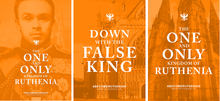Kingdom of Ruthenia
Kingdom of Ruthenia Reino da Rutênia (Portuguese) | |
|---|---|
Motto: "Nós Venceremos a Inveja com a Ajuda de Deus!" "We will overcome envy with God's help!" | |
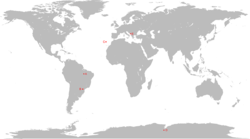 Location of Ruthenian territories in red. | |
| Status | Constituent country of the Karno-Ruthenian Empire. |
| Capital and largest city | Persenburg 49°36′N 6°7′E / 49.600°N 6.117°E |
| Official languages | |
| Religion (2021) | Roman Catholicism |
| Demonym | Ruthenians |
| Government | Confederate parliamentary constitutional monarchy |
• Monarch | Oscar I |
| Guilherme da Lomellina | |
| Legislature | Parliament |
| Council of State | |
| General Assembly | |
| Formation | |
| 19 November 2014 | |
| 30 March 2015 | |
| 21 October 2015 | |
| 10 March 2016 | |
| Area | |
• Total | 3 km2 (1.2 sq mi) |
• Water (%) | 2.0% |
| Population | |
• Census | 56 (inhabitants) |
| GDP (PPP) | 2020 estimate |
• Total | TBD |
• Per capita | TBD |
| GDP (nominal) | 2020 estimate |
• Total | TBD |
• Per capita | TBD |
| HDI (2018) | ▲ 0.941 very high · 23rd |
| CGSC (2021) | ▲ 5.00 very high · 5th |
| Currency | Ruthenian mark (RMK$)a (RMK) |
| Time zone | BRT (UTC−3) |
• Summer (DST) | BRST (UTC−2) |
| Date format | dd/mm/yyyy |
| Drives on the | right |
| Calling code | +55 |
| Microcode | RT |
| Internet TLD | .kr |
Ruthenia, officially the Kingdom of Ruthenia (Portuguese: Reino da Rutênia), is a confederate constitutional monarchy located in South America, Europe and Eastern Antarctica. Claiming approximately three kilometers of territory, its capital is Persenburg-Götzödorf, having previously been Alto da Solidão.
A constitutional monarchy since 6 February 2015,[1] state power is divided between the King, currently Oscar I, the Council of State, and the General Assembly. From the creation of the Kingdom until February 2015, Ruthenia was governed under an absolute monarchy, and for one week between January and February 2015, the King exercised a royal dictatorship.[2] After this, the Ruthenian democracy has become stable and has been perpetuated ever since.
Although founded in 2014 by the current King, the roots of Ruthenia date back a century, with great power exercised by the Royal Family in the Land of St. Stephen and Land of St. Peter and St. Paul, regions giving rise to the kingdom as it is known today. Ruthenia's territory has changed over time. In Brazil, virtually all land is owned by and under the direct rule of the King, with a flagrant tendency to expand. Overseas, the kingdom controls swathes of territory in Europe[3][4] and the Eastern portion of Antarctica.[5]
History
The first settlements on the land now claimed by Ruthenia date from the first half of the eighteenth century, having been founded with the arrival of the Royal Family of Portugal in Brazil. With the fall of Napoleon and the return of the Braganza Dynasty to Portugal, the House of Thomaz-Rocha decided to remain in the region, having established power and prestige among the locals.
From then on, the "ruling family" of Ruthenia ignored the government and wielded autonomy over the area, not being contested by any authority and acquiring more subjects. On 19 November 2014, after nearly two centuries of uninterrupted exercise of power in the region, a major step was taken. After gaining permission from his father, the now King Oscar of Ruthenia established the Throne of Ruthenia, declaring Ruthenia to be an independent kingdom.[6]
The next day, the flag and the national coat of arms, the royal title, the ministries of Foreign Affairs, Interior, Finance and the Royal Household, Defence and Immigration were established, and religious freedom in the kingdom was granted.[7]
In the early hours of 21 November, the Kingdom of Acrin was the first nation to recognize Ruthenia, followed by the German Reich of Mednyi and the People's Republic of Hashima. The following day, Ruthenia also established mutual recognition with the Kingdom of Wiltogo.
The first three months of Ruthenia's existence were plagued by uncertainty and political instability, but King Oscar was able to maintain order and develop the kingdom. On 22 March 2015, the capital was officially moved to the south, to Persenburg-Götzödorf,[8][9] having previously been Alto da Solidão. An Absolute Monarchy from his beginning, everything has changed with the Constitution of 2015.[10] Ruthenia became a confederate constitutional monarchy with a parliamentary system of government, wherein the King of Ruthenia is the Head of State and the Chancellor is the Head of Government, and the Power of the King was splited among the legislative, executive and judicial branches of government.
On 30 March 2015, the Royal House decided, after some controversy, to retrospectively recognise the Duke Ari of Ruthenia - father of King Oscar - as having been the first King of the country. Despite Oscar having exercised dominion over the government from its foundation on 19 November, it was only on 20 November that he was formally declared King, and so it was decided that for a few hours between 19 and 20 November, his father, the Duke Ari, had been the de jure King of Ruthenia. The Duke therefore had his style changed to Royal Majesty and was given right to a special coat of arms. Furthermore, his wife (the current king's mother) took the style of Royal Highness but kept her coat of arms. In practice, the only real effect of this decision was to add a king to the list of rulers and delay the official start of Oscar of Ruthenia's reign by one day.

Widely reported in the national and foreign media, the "Scandinavian Affair" was a crisis which started with a referendum to decide which national language would be adopted by Ruthenia. Lusophones and Anglophones had split the government, disputing for power, with the King favoring one against the other. The plebiscite ended with the victory of the supporters of the English language. With Portuguese limited to being the language of the royal court, the Lusophones began an exodus from Ruthenia. The Anglophones, led by the Duke of Erdene, tried to incite rebellion, later being punished.[11]
During this difficult time, the Empire of Munkkia approached the Ruthenian government, proposing a union between the two micronations. The Ruthenian people failed to approve of such a measure, not wishing to have their faith and culture become a minority. The union failed and the relationship between Munkkia and Ruthenia was severely damaged.[12] One of the most tragic moments was a false accusation of espionage made against a Norwegian subject, which caused national uproar, despite having also been an example of popular disapproval against union of the two countries.[13]
The decision not to join Munkkia was taken during a meeting convened by King Oscar, during which it was also decided that the King would participate more actively in power at least until a Constitution comes into force. Also on this occasion, it was announced that Ruthenia would be, until further notice, an absolute monarchy, and the King would exercise, with support from the General Assembly, a "royal dictatorship".[14] After the establishment of a constitutional monarchy, Ruthenia became a democratic micronation.
In March 2015, the King of Ruthenia and the President of Munkkia established informal conversations, restoring a peaceful distance betwwen the nations.
The Union with Libertia and Savage Islands

The Principality of Lomellina, a former ally of Ruthenia, was an enclave and exclave micronation with self-proclaimed territories in Antarctica, Italy and Greenland. In the 20 November 2014, the Lomellinian Aristocracy proposed a government change in which the High Chancellor Richard Abreo-Louis had complete ruling power over the aristocracy members, in a decision that did not pleased D. Guilheme I, the Prince of Lomellina, since the prince had gave great autonomy for aristocracy.
His denial caused the aristocracy to protest and started an anti-absolutist campaign against the prince on the 26 November. The same day, the event now called "Lomellinian Revolt" began, and Richard Abreo-Louis was crowned as the constitutional successor of Prince Guilherme and his reign lasted for only 3 days. On the 1 December, Guilherme I was officially overthrowed by Richard Abreo-Louis after the capture of Castello di Valle, Lomellina's capital city. After 4 December, Richard turned the nation into a State in which the only territorial possession was Castello di Valle, thus creating the State of Lomellina.

As for the dethroned D. Guilherme I, he exiled to the Autonomous Kingdom of the Savage Islands, which was formed by his cousin, King Francisco de Moniz II. After a week in exile, D. Guilherme took the conclusion that he still held ruling power in Lomellina Consolato and founded the Duchy of Libertia within the city along with his Ducal Family. On the 30 January 2015, D. Guilherme established contact with the King Oscar of Ruthenia, with the idea of annexing Libertia into his project, the Kingdom of Ruthenia, a request that was instantly accepted, since the two were old friends. King Oscar elected Guilherme as Chancellor of Ruthenia and a place his family between the other Ruthenian noble houses.[15]
On 23 February 2015, the monarch D. Francisco Moniz II gave the rights and sovereignty of the islands to his cousin, D. Guilherme da Lomellina e Berenguer, the then Duke of the Duchy of Libertia and Chancellor of Ruthenia. The Kingdom was transformed into the Grand Duchy of the Savage Islands and annexed to the Kingdom of Ruthenia, since D. Guilherme paid loyalty to the Ruthenian Monarchy.[16]
On 19 June 2015, D. Guilherme da Lomellina e Berenguer resigned to his title of Grand Duke, inherited by his cousin, King Francisco II due to the fact that the Portuguese Republic and the group called People's Alternative for the Canary Islands are both involved in a territorial dispute that could create diplomatic, political and physical problems to the Kingdom of Ruthenia and the Duchy of Libertia. On the same day, the King abdicated his Savish titles and dissolve the Grand Duchy. This fact ended the occupation which lasted four months and 17 days.[17]
Ruthenian Antarctica

After the loss of Savage Islands, the Ruthenian Government restarted the expansion plans. On 30 June, the Government of Ruthenia annexed the Kaiser Wilhelm II Land,[18] located on the eastern portion of Antarctica, which came to be known as Grand Duchy of Gaussland.[19] The Ruthenian government says "the move was to promote a better world through the protection of environment as well as in respect to the imperial ambitions que can only be filled by such attitudes".
The Kaiser Wilhelm II Land, the part of Antarctica lying between Cape Penck, at 87°43’E, and Cape Filchner, at 91°54’E, became an integral part of the Ruthenian State from the date of the decree issued by King Oscar, but at the time the Kingdom of Ruthenia was admitted as the sixteenth member of the Antarctic Micronational Union,[20][21] Ruthenia claimed a much larger territory, then ruling the territory between USLSSR and St.Charlie.[22]
The Kingdom of the Golden Dragon and the Throne of Lion

During the end of 2014 and the first half of 2015, the Brazilian micronationalism noted the creation of multiple projects lasting a few weeks and denoted a lack of professionalism and commitment to the expansion of micronationalism. When Filipe Machado founded the State of Bessabia,[23] known as the "Kingdom of the Golden Dragon" because of the coat of arms of the kingdom, the Crown of Bessabia was offered to the King of Ruthenia, who accepted. Although Bessabia has become part of Ruthenia and willing of great administrative autonomy and that the King had moderator power provided by law, Oscar of Ruthenia pledged not to make Bessabia only an administrative region of Ruthenia. Since then, the Bessabia became the Lusophone image of Ruthenia, responsible for the contact of Ruthenians with micronations from Brazil and Portugal, as well as others whose official language was Portuguese.[24]
Less than a month after the annexation of Bessabia, one of the biggest allies of Ruthenia between the Portuguese-speaking micronations, the Badakhshan, went into a dizzying dismantling of democracy and disappearance of micronational activity. In this scenario, the Ruthenian diplomacy interfered in the case and through intense negotiations, the King of Ruthenia became, on 20 September, the Shah of Badakhshan.[25] Through that act, the King of the Ruthenians became an imperial figure and Ruthenia increased its relevance in his country of origin. Although not considered a change of treatment or a transition from a royal centralized government to an imperial centralized government, profound political changes would be operated from that moment.
Despite Emperor Oscar's reign have been relatively successful and well accepted by most reputable micronations, it was a highly unpopular monarch. His subjects rejected it to see that it was a foreigner who did not identify with the micronation and who cared about the Anglophone sector, more than the Lusophone. Between the end of November and the first week of December of 2015, the political situation was unsustainable. The return of former monarch Jaffar Sheri brought concerns and uncertainties. Willing to regain the throne, he sought the support of other micronations and garnered support among the aristocracy and the military.[26]
Anticipating the coup through informations from the Ruthenian Secret Service, the Emperor decreed the dissolution of the Majlis, the parliament and took upon himself the command of the armed forces. Provided with dictatorial powers, contacted the Stadhouder of the United Provinces of Mauricia to hand over sovereignty over the territory, ending the Badakhshan as an independent and sovereign micronation.[27] A union treaty was signed in the last hours of the 8 December 2015. The Badakhshan became a province of a traditional Brazilian micronation and the then Emperor, deprived of his power, assumed the title of "Hereditary Lord of Badakistan Lands".[28]
The October coup attempt
On 22 October 2015, Nailimiskam Lisavovich Okbob, an alleged Ukrainian micronationalist, announced that it had established in 2007 its own "Kingdom of Ruthenia".[29] However, they were never presented evidence that foundation and the usurper was aware of the original Ruthenia, including the fact that he was a member of the M.A.G.N.A. Group, a Facebook group dedicated to convivial Ruthenians and friends of the micronation.
Ignoring the arguments of the Government of His Majesty, Okbob made maximum publicity possible, trying to promote his micronation as legitimate and as part of Ahaanian Union, a micronation founded earlier by the usurper. As a result, the Ruthenian government, through the Department of Information, launched a massive advertising campaign, highlighting the originality of the project and making it clear, through the slogan "The one and only Kingdom of Ruthenia, that there would only be room for only one Ruthenia.[30]
Treated as attempted coup by the legitimate Government of Ruthenia, the usurper was supported only by Cesidio Tallini, who tried to force a "peace agreement" where both micronations coexisted.[31] Oscar I of Ruthenia objected strictly condone what he declared to be a "fraud." The Legitimate Ruthenia was supported by the Republic of Lostisland, the Empire of Pavlov, the Principality of Aigues-Mortes, the Kingdom of Gaston, the Consulat of Surland, the Empire of Lemuria, the Kingdom of Ruritania and the Imperial Grand Duchy of Lundenwic.
It is regarded as the end of the incident the "abdication" presented by the usurper to the throne of Ruthenia.[32]
The Autumn Revolution in Acrin
During the first four months of existence of the Kingdom of Acrin, the King and his government were devoted to foreign relations, the formulation of their national symbols, which suffered greatly Ruthenian influence and attempts to attract investment and establish connections with other micronations, misguided attitudes that made the inexperienced government of the time lose much of their enthusiasm and credibility.

Over the next eight months, no activity was observed. The Ruthenian Government, the greatest ally of Acrin at the time, tried numerous times to contact, either in order to get news or in order to propose a union of crowns led by Ruthenia. In November 2015, when Acrin and Ruthenia would complete one year of existence, King Eitan was appointed to the Order of the Foundation of the Kingdom of Ruthenia. Before the failed attempt to contact the King of his award, the Ruthenian government began formulating an audacious plan.
On 19 November 2015, the Ruthenian government issued an ultimatum: either Acrin answer their messages within one month counting of that date, or the King of the Ruthenians, as Aristocratic Chieftain of the Clan of Acrin, would claim the throne for himself. Although this version of events be announced by the Ruthenian government, the first contact attempt occurred through Micronation.org Forum, nine days before the e-mail was sent to King Eitan and the government of Acrin.
There was no answer. In the words of King Eitan himself when he made the King of the Ruthenians the Aristocratic Cheftain of the Clans of Acrin, he explained that "You lead all the families as one aristocrat". Based on this interpretation, Oscar of Ruthenia not only was the last active Acrinian noble, as was also responsible for leading the nobility of Acrin. Thus, with the government abandoned, it would be an obligation of Ruthenians to protect the micronation.
Through a special decree of 15 December 2015, Oscar of Ruthenia dethroned King Eitan, granting to him, however, the title of Prince Szteinbaum of Acrin. In the same act, he removed the entire autonomy of Acrin, making the kingdom a little more than a Ruthenian province. Other executive acts were issued by the new king, who ordered new flag, new coat of arms, new capital and advertising his rise, which was greeted with enthusiasm in Ruthenia.[33] By becoming part of a larger kingdom, Acrin acquired more visibility, even though it cost their entire independence. Ruthenia, in turn, was little benefited, since the so-called "Autumn Revolution" only increased their territories and announced the start of its most aggressive and imperialist actions.
National colors and symbols
-
Civil Flag
-
State Flag
-
State Eagle
-
Greater Coat of Arms
-
Medium Coat of Arms
-
Small Coat of Arms
Politics
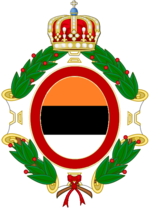
According to the Constitution of 2015,[34] Ruthenia is to be a confederate constitutional monarchy with a parliamentary system of government, wherein the King of Ruthenia is the Head of State and the Chancellor is the Head of Government. Power is separated among the legislative, executive and judicial branches of government, as defined by the Constitution, which serves as the country's supreme legal document. The king, who holds powers of interference in the branches of the government, acts as "Supreme Administrator".
The legislature is comprised of the Council of State and the General Assembly, which is made up of members appointed by the King and members elected by the people. Laws must be approved by the King before entering into force. The Monarch is Commander-in-Chief of the Ruthenian Armed Forces, and serves as chief diplomatic official abroad and as a symbol of unity. King Oscar I of Ruthenia of the House of Götzö-Thomaz-Rocha was crowned King of Ruthenia on 20 November 2014.[35] Officially, the Chancellor exercises executive powers. Constitutionally, legislative power is vested with Council of State as upper house and General Assembly as lower house.
Internal affairs
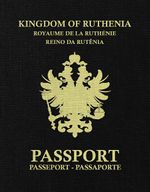
Ruthenia was dominated by political and social unrest during its first three months of existence. Disputes between the nobles forced Ruthenia to become a constitutional monarchy. After the promulgation of the Constitution, Ruthenia experienced a major phase of social and political achievements for many different classes of society and incentives to the economy, in what would become called the "social justice phase". From then on, Ruthenia withdrew from its image of archaic monarchy and became more in line with modern views of progressive governance, assuming a westernized government while the traditions, visibly influenced by Eastern Europe, were absorbed by a prosperous society.
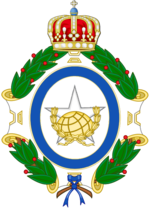
Foreign Affairs
The Ministry of Foreign Affairs conducted the foreign relations of the Kingdom, and negotiated treaties. The Ministry was led by the Foreign Minister, who is nominated by the King and who is also a member of the Council of State, the highest governing body of Ruthenia.
Since the foundation of the Kingdom, Ruthenia has established a great number of treaties and recognition terms with several other micronations.[36] In the early hours of 21 November, the Kingdom of Acrin was the first nation to recognize Ruthenia, followed by the German Reich of Mednyat (later known as the Principality of Pripyat') and the People's Republic of Hashima. On 22 November, mutual recognition was also established with the Kingdom of Wiltogo. The next day, the Convanese Republic also recognised Ruthenia.
Ruthenia established itself as a friendly micronation towards others, with mutual recognition treaties, formal relations, and alliances. The main goal of Ruthenia's foreign policy is to contribute to peace and stability in the intermicronational community.

Military
The duty of the Armed Forces of Ruthenia is to protect the kingdom, the King, and his subjects. The Armed Forces are divided into three branches: the Royal Army, the Royal Navy and the Royal Air Force. The Commander-in-Chief is the King, but the forces are also commanded by the Minister of National Defence, usually the same individual as the Director of the Ruthenian Secret Service (RSS).
Economy

Agriculture represents the largest component of GDP of the Kingdom, especially in the north. In the south, Ruthenia is bordered by São Paulo City, which is considered the "financial capital of Brazil", as it is the location for the headquarters of many major corporations and the country's most renowned banks and financial institutions. The per capita income for the kingdom is about US$4,000.
Energy
The energy that fuels the kingdom comes from several sources. In the north, there is the power supply from generators purchased in the Brazilian market and hydropower from rivers that make the border of the kingdom. In the south, the energy is purchased from the public company that provides the power supply to the city of São Paulo.
Transport

The means of transportation that are found in the realm differ between regions. In the northern portion of the kingdom, there are buses and cars, in addition to trucks, cars, carts and tractors made available by the Ruthenian government for the movement of subjects between the Land of St. Stephen and the Land of St. Peter and Paul. Small boats are also used to transport people and cargo along the rivers in the kingdom. In the south, a wide network of public transport in the city of São Paulo favors the residents of this part of the kingdom, as well as privately owned cars. The South Exclave is served by bus, trains, subways, taxis, and has access to two Brazilian airports.
Geography and resources

Ruthenia possess a cultivable area of 3.8 km2, already assigned to the cultivation of grain for domestic consumption and for raising cattle for slaughter and subsequent sale, in addition to the aforementioned domestic consumption.[37]
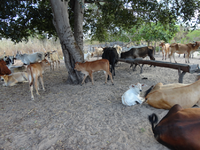
Ruthenia is bathed in a stream of clear water known in Brazil as "Rio Gurguéia"[38] and "Riacho das Lages", the latter known in Ruthenia as "Água Branca". There is also a dam, a lake (the "Lake of Dead River" in English) and three wells, all intended for reservation and distribution of drinking water. Due to the high incidence of sunlight, plus the ability to generate hydroelectric power due to the stream that runs along the border to the north-northeast, Ruthenia also makes use of sunlight and power generators bought in Brazil.
The climate is hot and humid in the northern part of the kingdom, but in the uplands it is dry with high day-time temperatures and cool nights. The South Exclave has a monsoon-influenced humid subtropical climate. In summer (January through March), the mean low temperature is about 17 °C (63 °F) and the mean high temperatures is near 28 °C (82 °F). In winter, temperatures tend to range between 11 and 23 °C (52 and 73 °F).
Administrative regions
Ruthenia is composed of four political units: the Kingdom of Ruthenia proper, the Duchy of Libertia, and the Grand Duchy of Gaussland and the Kingdom of Bessabia.[39] The Kingdom proper is a unitary polity divided into five areas ruled directly by the king: the Land of St. Peter, the Land of St. Paul, the Region of Alto da Solidão, the Duchy of Persenburg-Götzödorf (known as Royal District before February 2015) and the Grand Duchy of Escandia.

The Land of St. Stephen is located in the northern portion of Ruthenia, and is the largest part of the kingdom. It was in this region where the first capital was located, an autonomous region called Alto da Solidão. Not far from the Land of St. Stephen and of Alto da Solidão are the Lands of St. Peter and Paul, which are smaller and more isolated, with vast quantity of native vegetation - this differs from St. Stephen, which is an area marked by agricultural activity. In an area known as the Persenburg is a former royal residence, known as the Winter Residence, surrounded by the city of São Paulo in Persenburg, Brazil (which is basically a diplomatic representation of Ruthenia abroad), and the Grand Duchy of Escandia, an apartment acquired by the King in late 2013 and converted to a grand duchy in the following year.
The autonomous Duchy of Libertia is divided between the provinces of Grancasa e Arpuro and the Colony of La Hire.
Education and healthcare
Despite Ruthenia having no schools or universities, the government allows students to study in foreign territories, mostly in Brazil, and the Royal House helps to fund university fees. Most jobs available within Ruthenia are agriculturally-related. The more qualified manpower provides services to the royal house or is employed abroad.
Although there are no health centres or hospitals located within Ruthenia, use is made of nearby Brazilian hospitals.
Culture
Ruthenian culture retains much of the European influence originally brought by the Royal Family. It places an important emphasis on family, religion, and traditions in general, such as respect for holy days. One of the strongest expressions of Ruthenian culture is the typical dance usually performed in the days of Carnival and St. John's Day, a variation of the polonaise, but in a more hectic pace seen in steps and performed to percussion instruments. The waltz is reserved for more formal occasions, especially for Royal Court events. The Ruthenian music consists mainly of traditional Hungarian folk music, especially the Czardas, and music by prominent composers such as Bartók, Monti, Tchaiakovsky and Bizet. Other aspects of Ruthenian culture include horse races, hunts (currently banned by the Royal Family out of respect for the environment), Masses on Sundays, and festivals between June and August dedicated to St. Anthony and St. John, among others, where dancing around bonfires takes place.
Language


In everyday use, Portuguese is used by the majority of the Ruthenian people. Portuguese is also the official language in the Royal Court, but English and French also have regular use, especially by the government, and are the languages used by the Ministry of Foreign Affairs.
Religion
The official religion of Ruthenia is Roman Catholicism.[40] Although it is officially adhered to by the entirety of the population, the vast majority - including members of the Royal Family[41] - are not often seen attending the rituals of their faith. Although there is religious freedom under law, the traditionalism of Ruthenian society has resulted in strong opposition to prospective future expansion of new religions.
Cuisine
The Ruthenian cuisine is marked by the conspicuous use of meat in many of its traditional dishes. Typically, Ruthenians feed on rice accompanied by beans, quite varied green salad, and meat and eggs. A popular dish is the barbecue, especially beef, served with sauces or with French bread. In Persenburg, popular dishes include lasagna, pizza, pancakes, and also the consumption of sweets such as cakes and pies, all inspired by the European habits of the inhabitants of the capital.
National holidays
| Name | Date | Notes |
|---|---|---|
| New Year's Day | 1 January | The first day of the Gregorian year. |
| International Women's Day | 8 March | Celebration of respect, appreciation, and love towards women. |
| Easter Day | Between 22 March and 25 April | Celebrates the resurrection of Jesus. |
| International Workers' Day | 1 May | Honors the contributions that workers have made to the strength, prosperity, and well-being of the country. |
| Martyr's Day | 17 July | Tribute to Royal Passion-Bearers Nicholas II of Russia and his family. |
| King's Day | 14 August | Anniversary of His Royal Majesty, the King. |
| St Stephen's Day | 16 August | Tribute to the patron saint of Ruthenia and their Royal Family; Hungary's first king St. Stephen's Day, also the day of the Foundation of Hungary. |
| Armistice Day | 11 November | Commemoration of the armistice signed between the Allies of World War I and Germany and also in commemoration of both living and dead soldiers who served in any conflict.[42] |
| National Day | 19 November | The day of the Foundation of Ruthenia. |
| Christmas Day | 25 December | Traditional commemoration of the birth of Jesus. |
| New Year's Eve | 31 December | The final day of the Gregorian year; Saint Sylvester's Day. |
External links
- Official website
- Contacts
- Official Facebook page
- Government Twitter account
- Official Youtube channel
- Official forum
- Ruthenian Observer website
- Libertian Archives website
References
- ↑ King granted first Constitution for Ruthenia, The Ruthenian Observer
- ↑ Oscar I estabilish a Royal Dictatorship, The Ruthenian Observer
- ↑ Libertia join the Kingdom, The Ruthenian Observer
- ↑ Ruthenia Annexed the Savage Islands, The Ruthenian Observer
- ↑ Ruthenia Annexed the Kaiser Wilhelm II Land
- ↑ Foundation Act of the Kingdom of Ruthenia, in Portuguese
- ↑ Royal Decree nº 001-012
- ↑ Royal Decree nº 041 (22-03-2015)
- ↑ Ruthenia's new Capital, The Ruthenian Observer
- ↑ Constitution of the Kingdom of Ruthenia
- ↑ Crisis!, The Ruthenian Observer
- ↑ PROVOCATION!, The Ruthenian Observer
- ↑ CONSPIRACY!, The Ruthenian Observer
- ↑ Oscar I estabilish a Royal Dictatorship, The Ruthenian Observer
- ↑ LIBERTIA FOR RUTHENIA!, The Ruthenian Observer
- ↑ Ruthenia Annexed the Savage Islands, The Ruthenian Observer
- ↑ Headlines - June/2015, The Ruthenian Observer
- ↑ Decree of Annexation of the Kaiser Wilhelm II Land
- ↑ Headlines - June/2015, The Ruthenian Observer
- ↑ Kingdom of Ruthenia Granted AMU Membership, AMU Bulletin
- ↑ Ruthenia Granted AMU membership, The Ruthenian Observer
- ↑ Headlines - July/2015, The Ruthenian Observer
- ↑ History of Bessabia
- ↑ Announcement of the Invitation to Acceptance of the Throne of Bessabia
- ↑ Renunciation to the Throne, by the Shah Jaffar Shah of Badakhshan, 18 September 2015.
- ↑ Ruthenian Observer #060, 20 December 2015.
- ↑ Ruthenian Observer #060, 20 December 2015.
- ↑ Ruthenian Observer #060, 20 December 2015.
- ↑ "Down With the False King!", 'Micronations & Alternative Policies' Facebook Group, 22 October 2015.
- ↑ "Down With the False King!" Campaign, La Libertá Newspaper, 22 October 2015
- ↑ Long live the Kingdom of Rus’ (and the Kingdom of Ruthenia), by Cesidio Tallini.
- ↑ "Down With the False King!", 'Micronations & Alternative Policies' Facebook Group, 22 October 2015.
- ↑ Ruthenian Observer #060, 20 December 2015.
- ↑ Government of the Kingdom of Ruthenia Official Website
- ↑ Profile of the King of Ruthenia, Official Website
- ↑ Diplomacy of the Kingdom of Ruthenia, Official Website
- ↑ Geography, Official Website
- ↑ Gurguéia River, article from Wikipedia, the free encyclopedia
- ↑ Administrative Regions of the Kingdom of Ruthenia, Official Website
- ↑ Roman Catholicism, article from Wikipedia, the free encyclopedia
- ↑ Royal House of Ruthenia
- ↑ Law Project n. 009, establishing the Armistice Day in Ruthenia.


